We hope you can join us on October 1 to celebrate 50 years of the Clean Water Act. An outstanding group of experts will discuss the successes brought about from the Clean Water Act (and, yes, there are success stories), the problems that persist, and future concerns. You don't want to miss this event.
Following the carbon dioxide pipelines sometimes feels like we are riding a roller coaster, taking all kinds of twists and turns, racing skyward and plunging downward. And, so, the battle in getting landowners names continues. Summit is slowly releasing the names of the landowners facing eminent domain. At the same time, Summit is refusing to publish the names of landowners who are in the pipeline's path and has now appealed a judge's decision that the names are public to the Iowa Supreme Court. Navigator and Wolf are following Summit's lead and are requesting that the landowner names be kept confidential. Wolf failed to notify landowners of over 5,000 parcels that they are in the proposed pipeline corridor.
By the way, you may notice changes in how this newsletter appears. We had a major upgrade of the software used to produce this newsletter. We are working with the changes and also have some bug fixes coming.
Take care,
Pam Mackey Taylor, Chapter Director and Newsletter Editor
What you can do to help the environment
-
RSVP to our annual meeting on October 1, Waterloo, 10:30 to 4:00, "Celebrating 50 years of the Clean Water Act"
-
If you live in Dubuque, Jackson, Delaware, Clayton, Fayette, Allamakee, Winneshiek, or Howard County, and are a Sierra Club member, get more involved by serving on the White Pine Group Executive Committee
-
Donate to the Iowa Chapter of the Sierra Club so that we can continue our work.
-
Catch up on this month's lunch and learn education videos
In this issue of the Iowa Sierran
Water Quality and Agriculture
-
Annual meeting - October 1 - "Celebrating 50 years of the Clean Water Act"
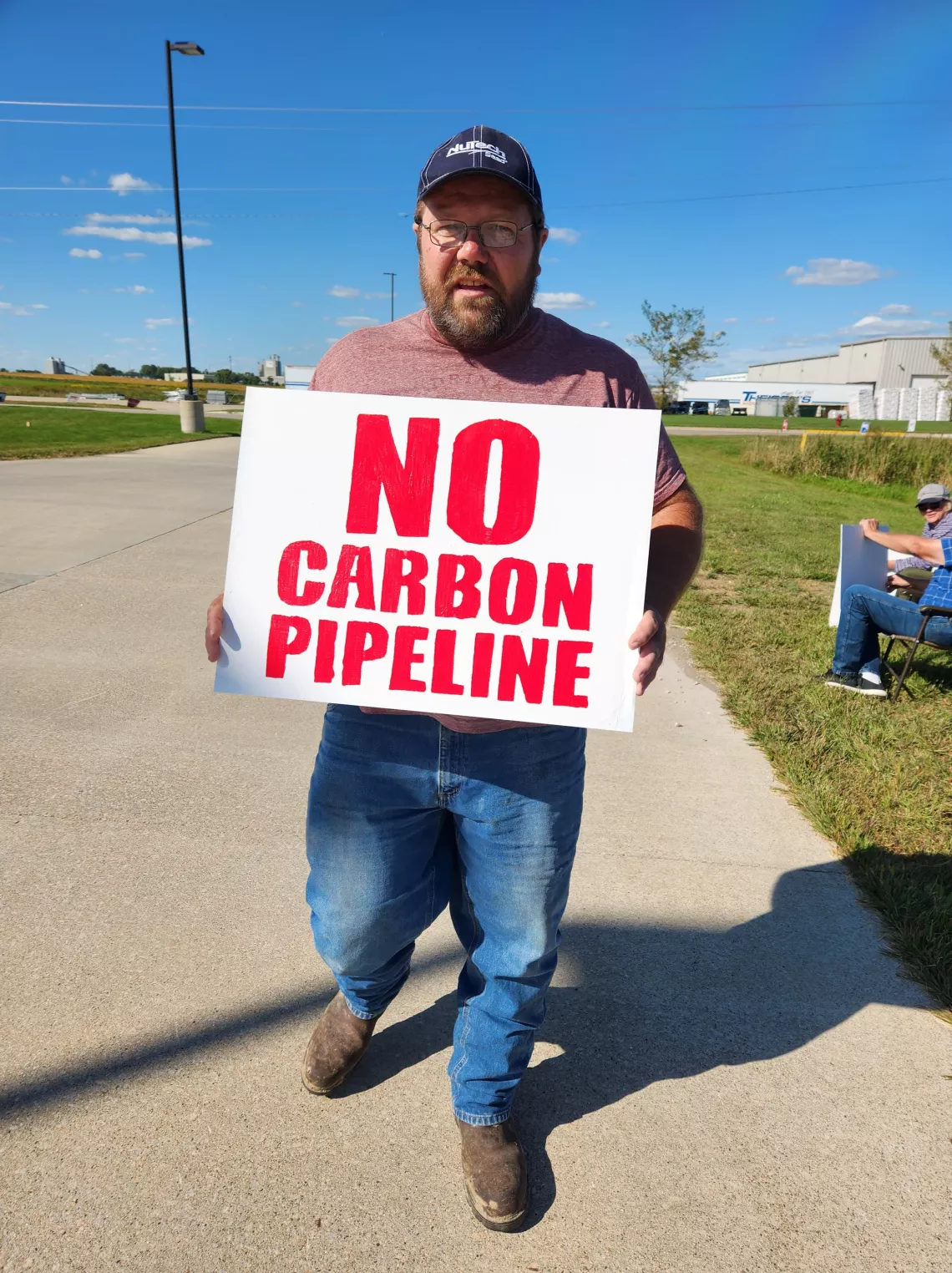
Carbon Dioxide Pipelines
-
Wolf Carbon Pipeline Fails To Notify Over 5,000 Landowner Parcels In Pipeline Corridor
-
Summit’s eminent domain requests are taking the whole farm
-
Summit Schedule to be set on Sept. 16
-
Summit goes to Supreme Court trying to keep landowners names confidential
-
Navigator and Wolf also want to keep landowners names secret
-
Navigator carbon dioxide pipeline meetings in September
-
Wolf carbon dioxide pipeline meeting Sept. 19
-
Ethanol’s Future Isn’t Bright: California bans the sale of gas powered vehicles in 2035
Events
-
Join us for interesting and informative webinars and Lunch and Learns
Plus
-
Contribute to the Iowa Chapter
-
Volunteer for the Iowa Chapter
-
Calendar of events
-
To see the archive of previous Iowa Chapter newsletters
-
To see the White Pine Needle newsletter
Annual meeting - October 1 - "Celebrating 50 years of the Clean Water Act"
The Iowa Chapter of the Sierra Club will be "Celebrating 50 years of the Clean Water Act" at the annual meeting on October 1. This year we will be gathering at the Waterloo Center for the Arts, 225 Commercial Street, Waterloo, Iowa. Doors open at 10:30. We will have a keynote speaker, followed by a great meal and a panel discussion. 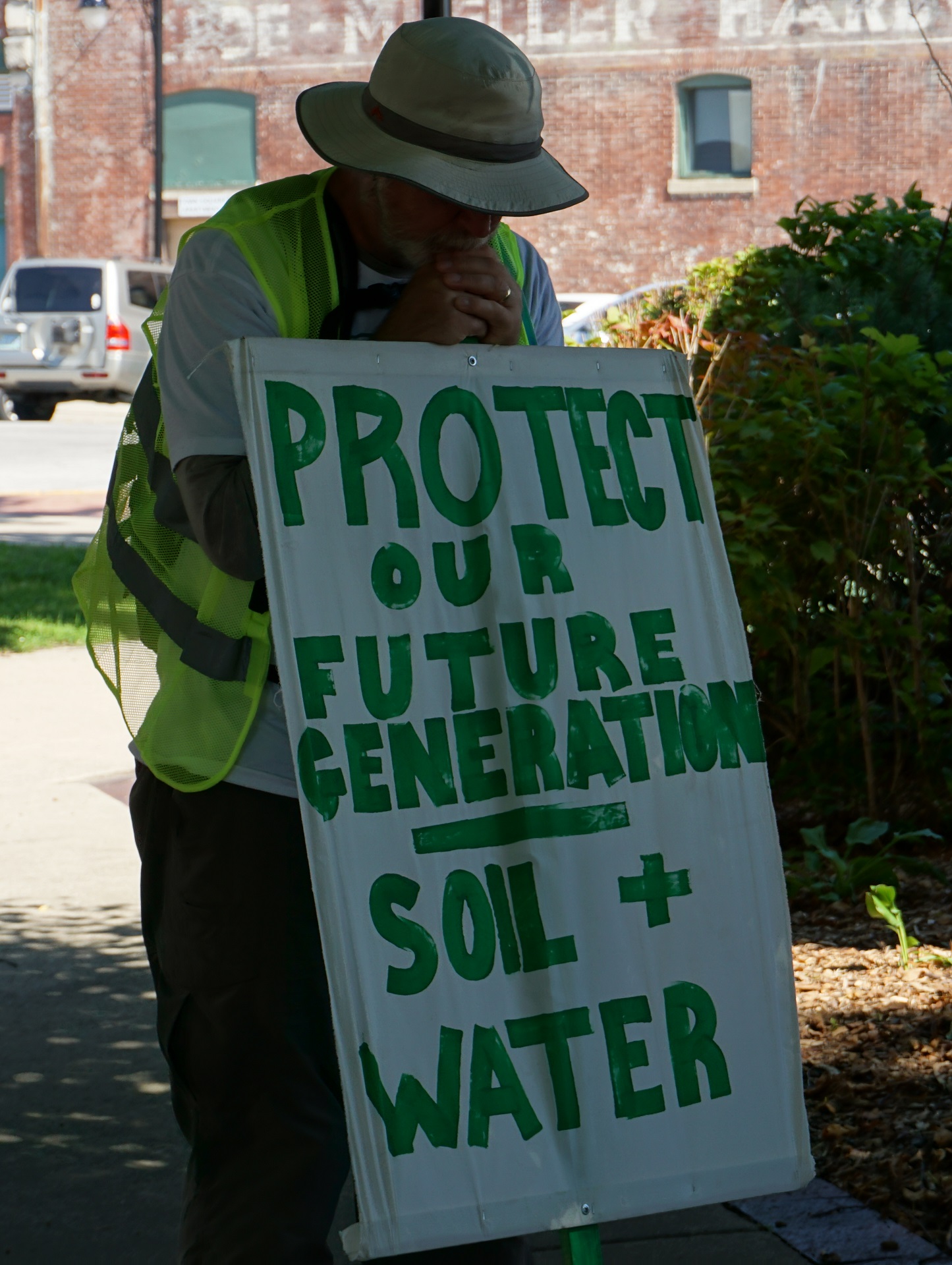
Water quality is one of the most important issues we face in Iowa. We will be learning about the good, the bad, and the hopes for the future of Iowa's waters. We are excited to present water quality experts for a stimulating discussion. We hope you can join us on October 1, from 10:30 to 4:00. The cost is $30 per person. RSVP by September 20.
Doors open at 10:30 am. The program is:
11:00 - keynote by Jerry Anderson, Dean of the Drake Law School. Jerry has taught environmental law at Drake and has also been involved in environmental law cases.
Noon - lunch by Catering by Dee
1:30 - panel discussion on water quality issues. Panelists are:
Chris Jones - Chris is a research engineer at the University of Iowa. His research interests include water quality and agriculture, water monitoring, and nutrient and sediment transport.
Silvia Secchi - Silvia is a professor in the Department of Geographical and Sustainability Sciences at the University of Iowa. Her research interests are environmental impacts of agriculture, water sustainability, floodplain policy, conservation policy, adaptation and mitigation to climate change, land use science, and integrated modeling.
Steve Veysey - Steve retired from his career as a chemist at Iowa State University. Steve is an avid fisherman and a long-time advocate for clean water. He has been involved in petitioning for anti-degradation rules, for water quality standards, and is currently working with Sierra Club in challenging the Supreme Beef permitting in Clayton County.
Matt Liebman - Matt is a professor emeritus of agriculture at Iowa State University and the Henry A. Wallace Endowed Chair for Sustainable Agriculture. His research, teaching, and outreach, activities focus on ways to improve environmental quality and agricultural productivity while reducing dependence on agrichemicals and fossil fuels.
Wally Taylor, moderator - Wally is an attorney practicing in Cedar Rapids. He specializes in environmental law cases.
Please join us on October 1, from 10:30 to 4:00. The cost is $30 per person. RSVP by September 20
For questions, contact iowa.chapter@sierraclub.org or 515-277-8868.
Wolf Carbon Pipeline Fails To Notify Over 5,000 Landowner Parcels In Pipeline Corridor
Prior to filing an application to build a carbon dioxide pipeline in Iowa, the pipeline company must notify landowners who are in the corridor and must invite them to an informational meeting. The informational meeting includes representatives of the Utilities Board, representatives of the Office of Consumer Advocate, and representatives of the pipeline company. The informational meetings are held in each county the pipeline will cross. After the informational meeting in each county, the pipeline company's land agents can begin negotiating the sale of the easement and also surveyors can go on the land to survey.
Wolf arbitrarily decided to do things differently. They decided to consider a corridor two miles in width. They also decided that they were not going to notify all landowners in the corridor. They claimed that they did not notify landowners whose land would not be crossed by the pipeline. Wolf official Tracey McDaneld stated, “the company looked at the 90 miles of pipeline planned to cross Iowa and removed any “environmental avoidance” areas - and their landowners - from its mailing list.” McDaneld went on to say “There’s a chance you were part of that removal, and that you’re in the corridor but not part of the corridor”.
In response to Wolf’s reasoning for excluding landowners, Cheryl Dakes, Linn County impacted landowner replied “That makes no sense to me. I’m in the corridor and I deserve to be notified. Either they made an unacceptable error in getting basic mailing addresses and are now lying about it or they willfully excluded Iowans who will be impacted by the pipelines. Why should we trust them to build a hazardous liquid pipeline through our communities, homes and our farms?"
Wolf Carbon Solutions failed to notify landowners owning 5,389 parcels of land in the pipeline corridor in Linn, Johnson, Cedar, Clinton and Scott Counties. At the informational meeting in Linn County, Iowa Utilities Board Chair Geri Huser announced that Wolf's land agents cannot contact landowners who haven’t been notified and that landowners do not have to allow surveyors on their land if they haven’t been notified.
The Iowa Chapter of the Sierra Club Iowa Chapter believes Wolf should start the informational meeting process over again. “Landowners need to be notified properly and given a chance to participate in the IUB process. Wolf needs to start the whole process over again,” said Jess Mazour, Conservation Program Coordinator for the Iowa Chapter of the Sierra Club.
Further, Wolf asked the Utilities board for confidential treatment for their mailing list. “This is a perfect example of why the landowners mailing lists should be made public as soon as they are submitted to the Iowa Utilities Board.” Said Pam Mackey-Taylor, Sierra Club Iowa Chapter Director. One of the functions served by the Sierra Club is to be a watchdog over government agencies. This Swiss-cheese approach of notifying landowners illustrates how important that oversight role is.
Landowners in Wolf's planned pipeline corridor who have not been notified of the informational meetings should contact the Office of Consumer Advocate at IowaOCA@oca.iowa.gov. The Consumer Advocate is part of the Attorney General's office. They represent the public interest in proceedings before the Utilities Board.
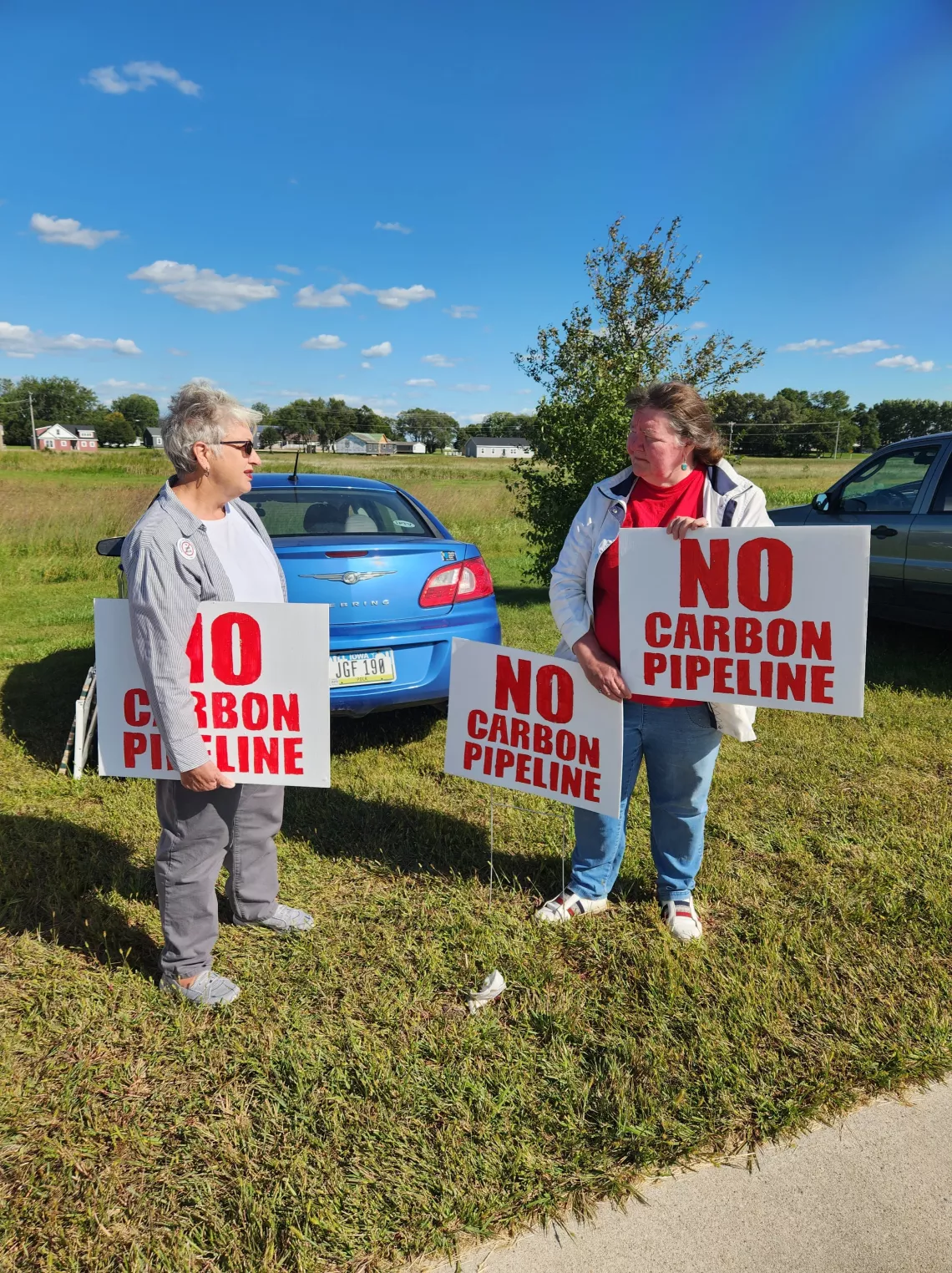
Summit’s eminent domain requests are taking the whole farm
One of the key documents the carbon dioxide pipeline companies must submit to the Iowa Utilities Board (IUB) is called Exhibit H, which lists all of the parcels where eminent domain will be required. The pipeline companies can request the IUB to grant them the right of eminent domain to acquire an easement on private property. The pipeline companies must list all of those properties and the landowners’ names on Exhibit H. Summit has been filing these Exhibits since August. Exhibit H is also important since it lets the landowners and the public know the route of the pipeline across the state of Iowa.
Landowners have been observing a significant issue. For those landowners who have several adjacent parcels, Summit is filing for eminent domain on all parcels, even if those parcels are not expected to host the pipeline. For landowners with several adjoining parcels, Summit is asking the Utilities Board to give them eminent domain on the whole farm.
The county assessor treats a parcel as a separate piece of land, which is given a separate bill for property taxes. When an abstract is created or updated, each parcel has its own abstract.
Summit Schedule to be set on Sept. 16
Once Summit's Exhibit H is filed, the IUB can proceed with setting schedules for future action – dates when testimony must be filed, deadlines for intervention, and the targeted dates for the hearing. The Utilities Board is convening a hearing on September 16 with Summit, the Office of Consumer Advocate, and all intervenors (including the Sierra Club) to set the schedule.
Summit goes to Supreme Court trying to keep landowners names confidential
In August, Polk County District Judge David Nelmark ruled that the Iowa Utilities Board must make the list of landowners likely to be impacted by the Summit Carbon Solutions carbon dioxide pipeline available to the public. This month, Summit appealed that decision to the Iowa Supreme Court.
The case started with the Iowa Utilities Board (IUB). The Iowa Chapter of the Sierra Club asked the IUB to release the names of landowners that Summit planned to cross with their carbon dioxide pipeline, requesting the names under the Iowa Open Records Law. The Utilities Board refused to release the landowner’s names at Summit’s request. As a result, Summit took the case to the Polk County court in an attempt to keep the names from being made public.
Jess Mazour, Conservation Program Coordinator for the Iowa Chapter of the Sierra Club states, “The open records request for the landowner list was made by the Sierra Club’s Iowa Chapter so that landowners would be able to know who their fellow landowners were and to organize opposition to the pipeline project. Summit vigorously fought to keep the landowner list confidential so the landowners could not form a unified opposition.”
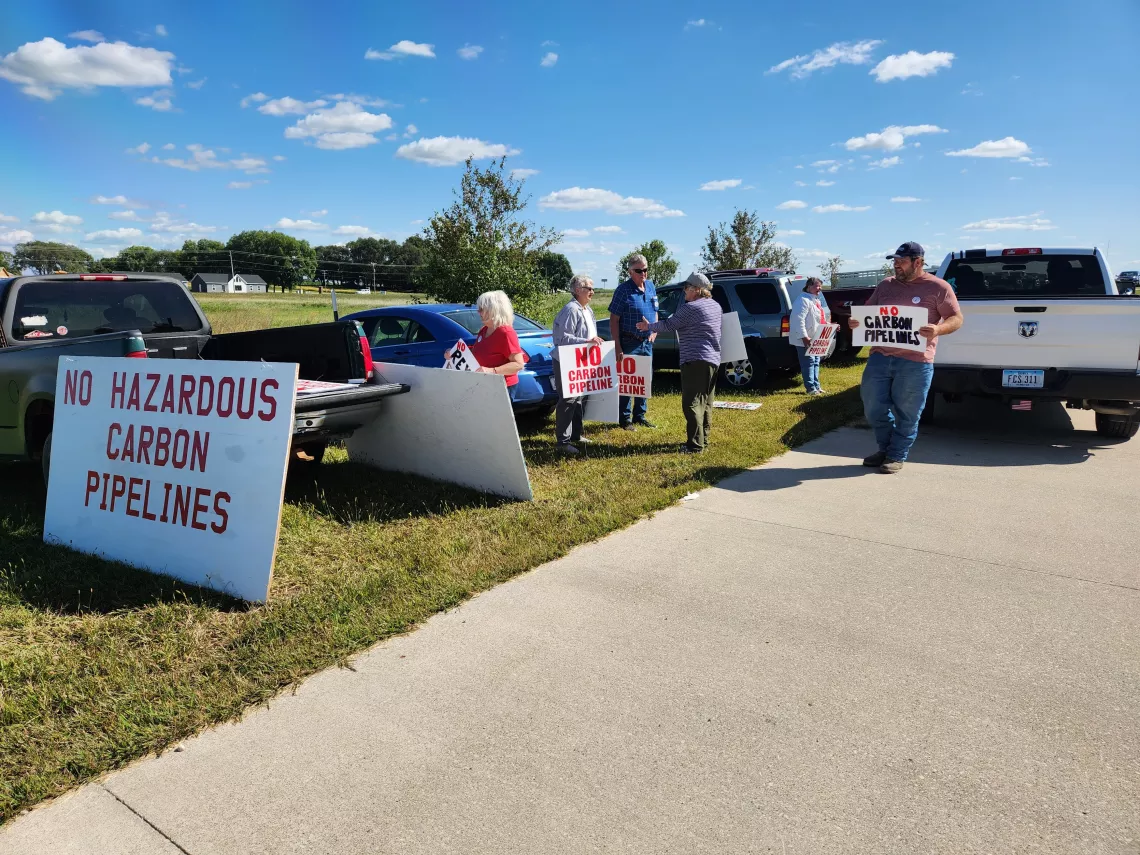
Navigator and Wolf also want to keep landowners names secret
Navigator and Wolf have also jumped on the bandwagon to keep the names of landowners affected by the pipeline secret. Navigator and Wolf have gone to Polk County Court with their request.
Complicating matters for Navigator is that they abandoned part of their original route when Archer-Daniels-Midland Company (ADM) contracted with Wolf to dispose of their carbon dioxide, yet to this date have never notified the landowners along the abandoned route.
Those landowners received a certified letter from Navigator telling them that they were in the pipeline corridor. They attended the informational meeting hosted by the Utilities Board and Navigator. Yet, none of them have received a notice that they will not be affected by the pipeline.
The abandoned route is in Benton, Cedar, Clinton, Iowa, Linn, and Poweshiek Counties.
Navigator carbon dioxide pipeline meetings in September
The Navigator pipeline project connects ethanol and fertilizer plants in Iowa to a pipeline that leads to Illinois where the carbon dioxide (CO2) will be stored underground.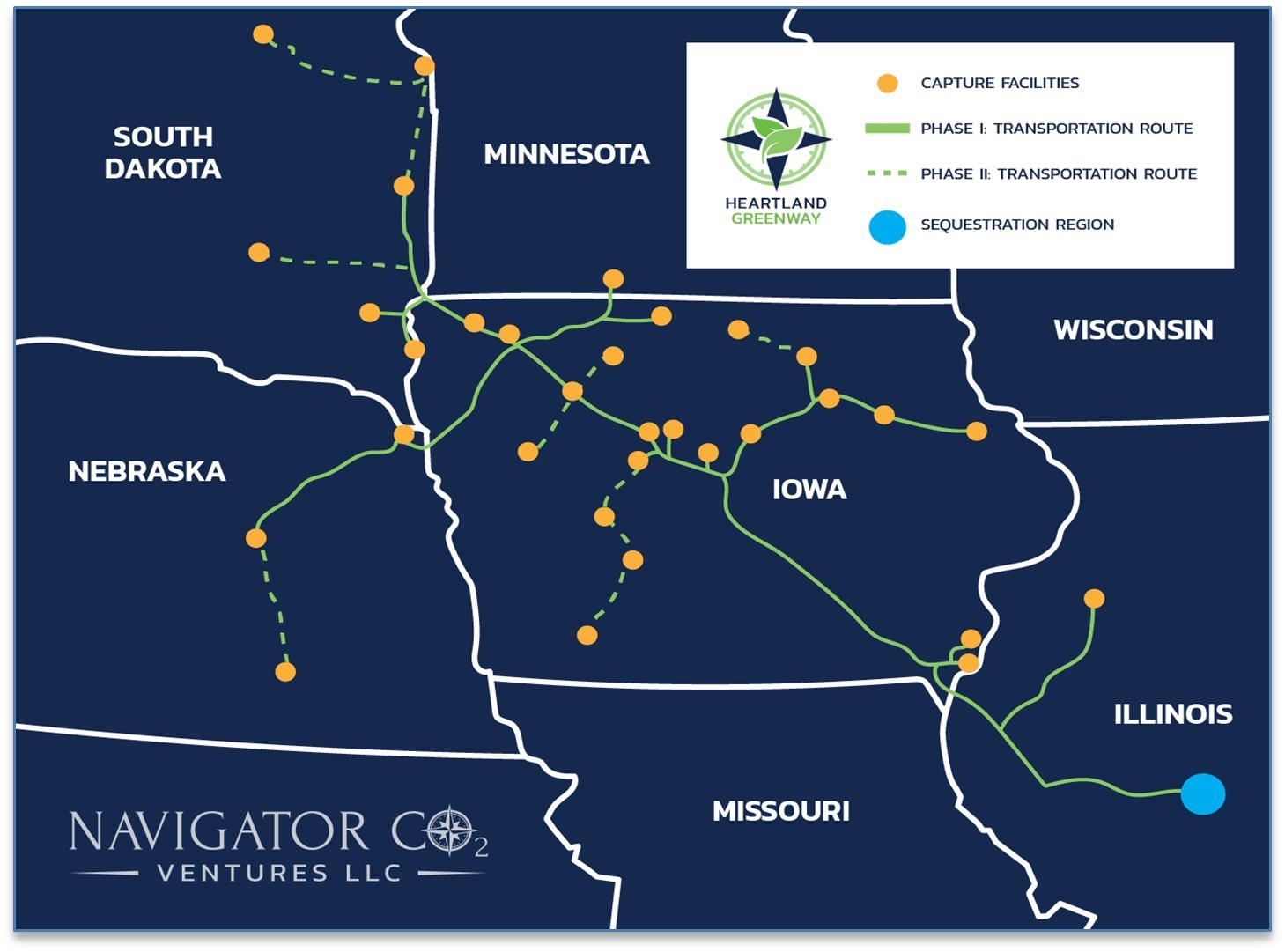 See a map of the counties that will be crossed by the project.
See a map of the counties that will be crossed by the project.
Navigator recently announced that it was changing its route in Iowa and would also be building the pipeline in two phases. As a result, Navigator is required to hold a number of additional public meetings. Navigator is wrapping up a series of meetings involving the landowners and the Iowa Utilities Board in September. The schedule is:
|
County |
Date |
Time |
Location |
|
Lee |
Sept 15 |
12:00 PM |
Lee County Fairgrounds, Youth Learning |
|
Polk |
Sept 21 |
12:00 PM |
FFA Enrichment Center, 1055 SW Prairie Trail Pkwy, Ankeny, IA 50023 |
|
Virtual Meeting |
Sept 21 |
6:00 PM |
https://iub.iowa.gov/board-activity/hearing-and-meeting-calendar |
Wolf carbon dioxide pipeline meeting Sept. 19
Wolf Carbon Solutions is partnering with Archer-Daniels-Midland Company (ADM) to run a carbon dioxide pipeline from Cedar Rapids, to Clinton, Iowa, and then to Decatur, Illinois. 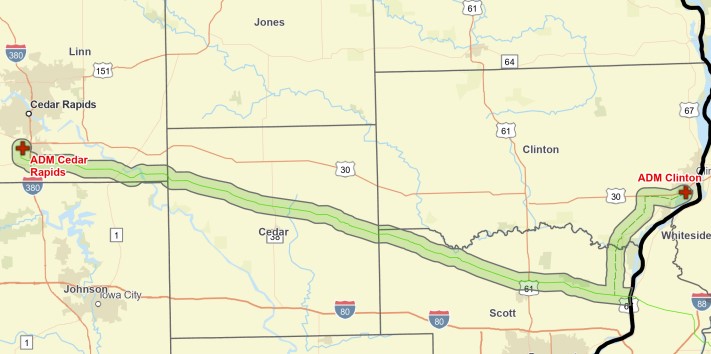 Along the way, the pipeline will cross 5 Iowa counties – Linn, Johnson, Cedar, Clinton, and Scott. The company and the Iowa Utilities Board have been hosting public meetings in each county. One meeting remains - a virtual event on September 19 at 6:00pm - which is accessed via https://iub.iowa.gov/board-activity/hearing-and-meeting-calendar
Along the way, the pipeline will cross 5 Iowa counties – Linn, Johnson, Cedar, Clinton, and Scott. The company and the Iowa Utilities Board have been hosting public meetings in each county. One meeting remains - a virtual event on September 19 at 6:00pm - which is accessed via https://iub.iowa.gov/board-activity/hearing-and-meeting-calendar
Ethanol’s Future Isn’t Bright: California bans the sale of gas powered vehicles in 2035
By Pam Mackey Taylor
The companies planning the carbon dioxide pipeline have been using two reasons to justify building their pipelines. First, they emphasize that the ethanol plants will be able to sell ethanol to California and get benefits for being a clean fuel. Second, they state that the federal 45Q tax credits give them financial incentives to use the carbon dioxide for enhanced oil recovery or for permanent burial in underground rock formations.
At the end of August, the California Air Resources Board (CARB) approved a rule that requires all new car sales in California to be zero-emission vehicles (ZEVs) by 2035. Before 2035, the requirement for zero-emission vehicles will be implemented in phases, starting with a requirement of 35 percent of new vehicles sold by 2026 being ZEVs and then moving to 68 percent by 2030. In other words, all new cars sold from 2035 onward will be battery-operated or hydrogen-fueled. They will not be powered by fossil fuel nor will they be powered by ethanol blends of fuel.
Other states are expected to follow California’s lead. California auto sales account for 10 percent of the US auto market.
What this means is that the demand for ethanol-based fuels will significantly decline. The rationale of selling ethanol to California in order to meet clean fuels standards has evaporated. The handwriting is on the wall. Ethanol is clearly in transition to significantly lower sales.
The economic lifespan of pipelines is significantly less as the transition from ethanol to zero-emission vehicles in California and the rest of the country accelerates.
If the demand for ethanol decreases, the ethanol industry will face challenges in staying in business. It makes no sense to build a pipeline infrastructure that will damage farmland across the state for an industry that is going to have a troubled future.
The Inflation Reduction Act significantly increased the 45Q tax credits, from $35 to $60 per metric ton for enhanced oil recovery and from $50 to $85 per metric ton for geological burial. The net effect will to transfer even more taxpayer money to benefit the ethanol and fertilizer manufacturers, along with the three pipeline companies with projects in Iowa. It is unfortunate that the hardworking taxpayer is being forced to subsidize the pipelines.
Given the prospects for ethanol, it becomes prudent that the Iowa Department of Agriculture and Land Stewardship develop a plan for a future of farming when the hopes of the ethanol industry are dashed. It won’t be just the ethanol industry that declines; it will be the farmers producing the corn for the ethanol industry. Nobody wants to see the farmers suffer. So what should we, as a state, be doing to provide contingencies in the event that demand for ethanol continues its decline?
Sources
Press Release by Governor Gavin Newsom, “California Enacts World-Leading Plan to Achieve 100 Percent Zero-Emission Vehicles by 2035, Cut Pollution”, Aug 25, 2022
Kathleen Ronayne, “California phasing out gas vehicles in climate change fight”, Associated Press, August 25, 2022
White Pine Group Seeks Executive Committee Members
Would you like to get more involved in Sierra Club activities? The White Pine Group of the Sierra Club is seeking volunteers to serve on its executive committee. If you live in Dubuque, Jackson, Delaware, Clayton, Fayette, Allamakee, Winneshiek, or Howard County, and are a Sierra Club member, then you can get more involved by serving on the Group Executive Committee. The executive committee decides which projects to engage in, holds educational meetings, hosts an annual turkey dinner in the fall, and conducts outside activities. Contact Dick Worm at raworm@msn.com for more information.
Join us for interesting and informative webinars
Lunch and Learns
Every Friday at noon, we do a Lunch and Learn livestream. See us on Facebook at "Sierra Club Iowa Chapter". These will be recorded so you can watch them anytime. Topics will be selected based on what is happening during the week and will be announced the day before the livestream. During the legislative session, we cover issues coming before the Iowa legislature.
In case you missed our past webinars and lunch and learn sessions, you can still see them.
- View "Pipeline Update: Transparency Needed!", September 9, 2022
- See "Celebrating 50 Years of the Clean Water Act", September 2, 2022
- Watch "Carbon Pipeline Update!", August 26, 2022
- Watch Katie Rock's presentation, "The Inflation Reduction Act: What's in It?", August 19, 2022
Volunteer for the Iowa Chapter
Almost everything we do is done by volunteers like you. If you would like to volunteer for the Iowa Chapter, please let us know by sending an E-mail to Iowa.chapter@sierraclub.org. Or sign up by using the online form. There are many opportunities for you to make a difference:
-
making phone calls
-
developing graphics for banners and flyers
-
working on legislative issues
-
working on elections
-
fundraising
-
organizing events
-
joining an issue committee
If you would like to join our legislative action team, sign up here. Keep on top of what is happening at the Iowa legislature. Be alerted when you should contact your legislators about pending legislation.
Contribute to the Iowa Chapter
Sierra Club - the best bet for achieving bold solutions to Iowa’s environmental problems
Sierra Club is Iowa’s oldest and largest grassroots environmental organization. Not only that, we are the best bet in the state for achieving bold solutions to Iowa’s environmental problems.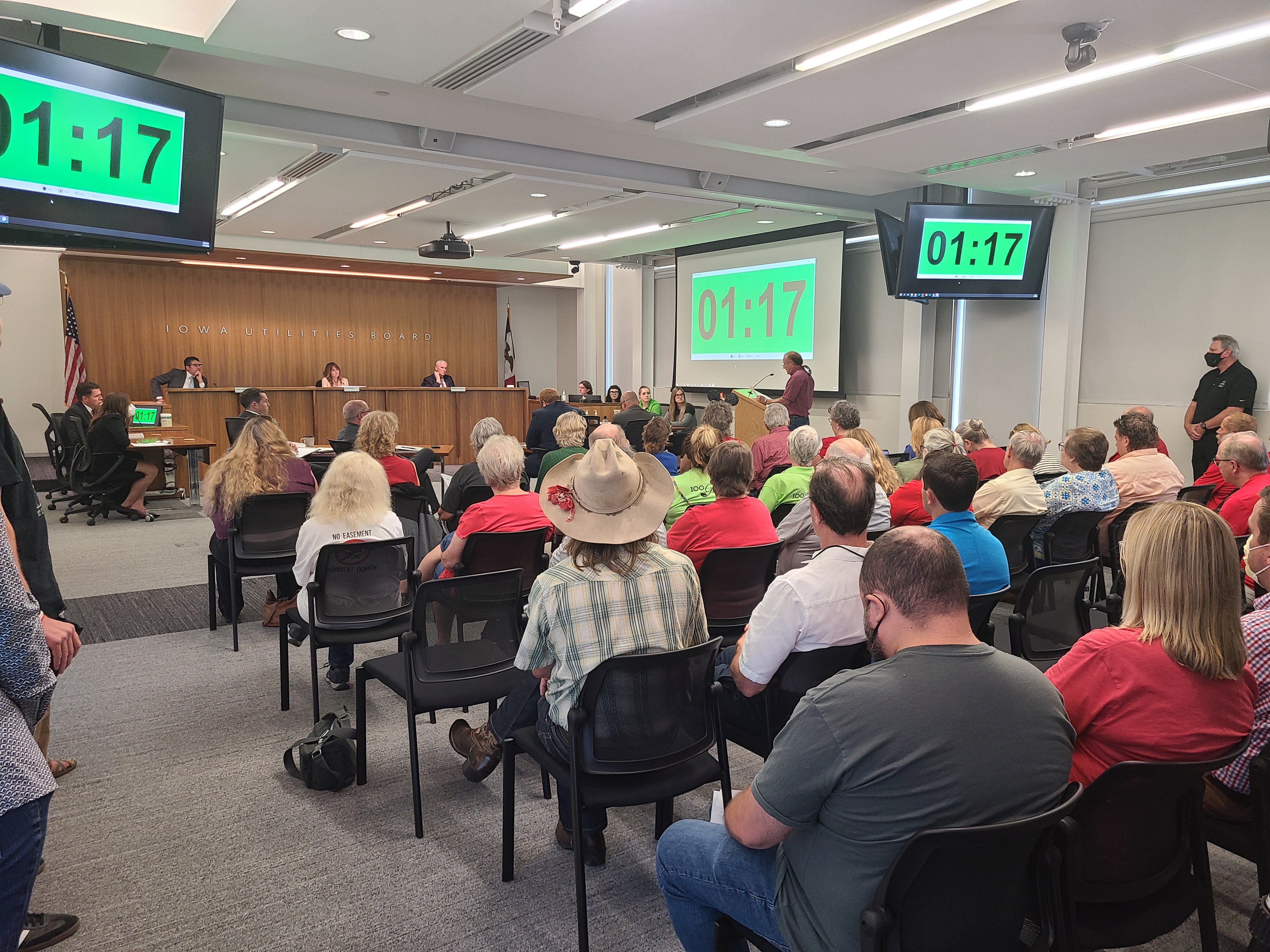
We work in the courts, before Iowa’s public agencies, and in the halls of the legislature. The Iowa Chapter's effort to protect the environment takes financial support. The Chapter receives very little financial support from the national Sierra Club. Can we count on you for a donation to ensure even more victories? Your contribution will be put to work here in Iowa on issues that affect every day Iowans – water quality, clean air, protection of Iowa's soil, parks and natural areas, and a strong democracy. The Iowa Chapter is relentless in fighting back bad legislation that affects every one of us.
Your non-deductible contributions make it possible for us to fight bad legislation and to promote good legislation. We appreciate your past and on-going support of these efforts. You can make a non-deductible donation with a credit card. A non-deductible donation supports the Chapter's effective, citizen-based advocacy and lobbying programs. If you prefer, a non-deductible check can be written to the Sierra Club Iowa Chapter and mailed to:
Treasurer
Sierra Club, Iowa Chapter
PO Box 1058
Marion, IA 52302
You can also make a tax-deductible donation with a credit card. Tax-deductible activities are limited to public interest education, research and legal actions. A deductible check can be written to the Sierra Club Foundation with “Iowa Chapter” written in the memo line.
Thank you for your support.
Donate your used vehicle
As the Sierra Club Foundation's Iowa Chapter continues to raise charitable funds to support its work in Iowa, won’t you consider participating in our vehicle donation program? Our partners over at CARS have made the process of donating your unused or unneeded car, truck, motorcycle, boat or RV easy, efficient and secure. They’ll take care of everything from picking up your vehicle to sending you a tax receipt for your generous gift. To learn more about The Sierra Club Foundation's Iowa Chapter vehicle donation program, please call 844-674-3772. Or visit our webpage to get started today!
Sierra Club Foundation promotes climate solutions, conservation, and movement building through a powerful combination of strategic philanthropy and grassroots advocacy. The Foundation is the fiscal sponsor of Sierra Club’s charitable environmental programs.
For more information
Planned giving . . . naming the Sierra Club Iowa Chapter in your will
Ensure your environmental legacy by naming the Iowa Chapter in your will or trust. These gifts cost you nothing now. You can hold onto your assets for as long as you need them.

Thank you for supporting our work!
| When | Earliest: Latest: |
| What |
|
| Word or Phrase | Word or phrase to search for: |
| Leader | All or part of leader name to search for: |
No Matching Activities Found
Loading
| Date | Activity (click title for full description) | Sponsor | Category | Type | Difficulty | Links |
|---|
Loading ...
 Outing
Outing Club support event
Club support event  Social event
Social event  Activist event
Activist event  Multiple events (map only)
Multiple events (map only)